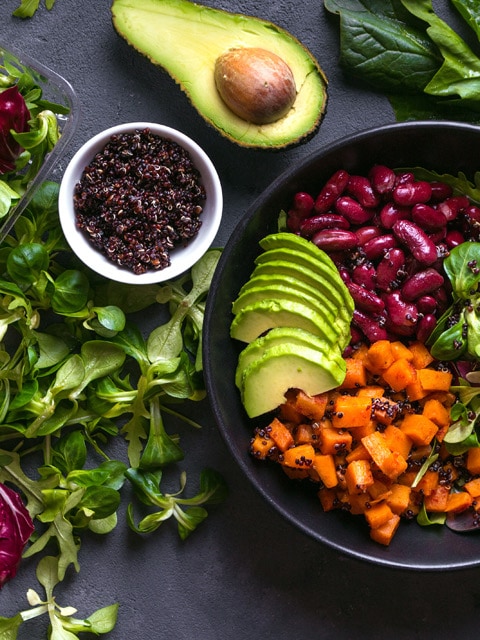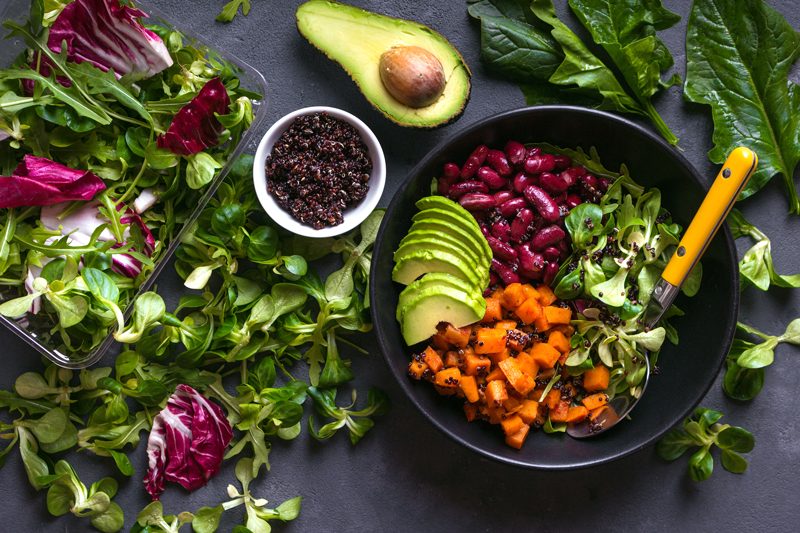#3 – A Quick Glance at Vegan Protein Foods

 Add to favorites
Add to favorites
This post is not a complete list of every raw food that contains protein, but it’s a great start. Some of these numbers may seem insignificant but build a salad or dish combining a large variety of these foods, and you will quickly find yourself with a protein-packed meal. I hand-selected and researched each item listed below. I gathered the protein information through
Nutritionix.
To learn more about raw vegan protein, click (here).
BUTTERS
- Almond Butter 2 Tbsp (32g) – 6.8g protein
- Cashew Butter 2 Tbsp (32g) – 3.8g protein
- Coconut Butter 2 Tbsp (32g) – 2.2g protein
- Hazelnut Butter 2 Tbsp (32g) – 4.4g protein
- Peanut Butter 2 Tbsp (32g) – 7g protein
- Sunflower Seed Butter 2 Tbsp (32g) – 5.5g protein
- Tahini Butter 2 Tbsp (32g) – 5.2g protein
CACAO / CAROB
- Cacao Powder 1 Tbsp (7g) – 1.4g protein
- Cacao Nibs 1 Tbsp (9g) – 1.3g protein
- Carob Powder 1 Tbsp (12g) – 1g protein
FLOUR
- Almond Flour 1/2 cup (56g) – 12g protein
- Buckwheat 1/2 cup (60g) – 7.5g protein
- Coconut Flour 1/2 cup (48g) – 3.3g protein
- Oat Flour 1/2 cup (52g) – 7.5g protein
- Tiger Nut Flour 1/2 cup (60g) – 4g protein
GRAINS
- Buckwheat 1/2 cup (84g) – 2.9g protein
- Chickpeas 1/2 cup (82g) – 7.5g protein
- Lentils 1/2 cup (99g) – 9g protein
- Millet 1/2 cup (87g) – 3g protein
- Oats, rolled, GF 1/2 cup (41g) – 5.3g protein
- Oat Groats 1/2 cup (85g) – 2.9g protein
- Quinoa 1/2 cup (93g) – 4.1g protein
- Forbidden Rice 1/2 cup (79g) – 2.1g protein
- Wild Rice 1/2 cup (82g) – 3.3g protein
NUTS
- Almonds 1 oz (28 g) – 6g protein
- Brazilnut 1 oz (28g) – 4g protein
- Cashews 1 oz (28g) 4.3 g protein
- Hazelnut 1 oz (28g) – 4.3g protein
- Macadamia 1 oz (28g) – 2.2g protein
- Peanuts 1 oz (28g) – 7.3g protein
- Pecans 1 oz (28g) – 2.7g protein
- Pili 1 oz (28g) – 3g protein
- Pine 1 oz (28g) – 3.9g protein
- Pistachio 1 oz (28g) – 6g protein
- Tiger 1 oz (28g) – 3g protein
- Walnuts 1 oz (28g) – 4.3g protein
SEEDS
- Chia Seeds 1 Tbsp (12g) – 2g protein
- Flax Seeds 1 Tbsp (10g) – 1.9g protein
- Hemp Seeds 1 Tbsp (10g) – 3.2g protein
- Inchi Seeds 1/4 cup (28g) – 8.8g protein
- Pumpkin Seeds 1/4 cup (32g) – 6g protein
- Sunflower Seeds 1/4 cup (13g) – 1.6g protein
- Sesame Seeds 1 oz (28g) – 4.8g protein
SPROUTS
- Alfalfa Sprouts 1 cup (33g) – 1.3g protein
- Broccoli Sprouts 1 cup (33g) – 1.3g protein
- Lentil Sprouts 1 cup (33g) – 6.9g protein
- Mung Bean Sprouts 1 cup (124g) – 2.5g protein
- Pea Sprouts 1 cup (120g) – 11g protein
SUPERFOODS
- Nutritional Yeast 2 Tbsp (17g) – 7.6g protein
- Sacha Inchi Protein Powder 1/4 cup (40g) – 24g protein
- Spirulina 2 Tbsp (7g) – 5g protein
SUPPLEMENTATION
- Sun Warrior Raw Plant-Based Complete Protein Powder 1 scoop (25g) – 17g protein
VEGGIES
- Asparagus 5 spears (75g) – 1.8g protein
- Avocado Flesh 1 (136g) – 2.7g protein
- Broccolini 1 cup (122g) – 2.4g protein
- Brussel Sprouts 8 each (168g) – 4.3g protein
- Chinese Cabbage 1 cup (70g) – 1.1g protein
- Collard Greens 1 cup (190g) – 5.1g protein
- Kale 1 cup (130g) – 2.5g protein
- Edamame shelled 1/2 cup (78g) – 9.2g protein
- Mustard Greens 1 cup (56g) – 1.6g protein
- Peas 1 cup (160g) – 8.6g protein
- Snow Peas 1 cup (160g) – 5.2g protein
LEGUMES, UNCOOKED
The following nutrient-dense foods are packed with protein, fiber, minerals, B vitamins, protective antioxidants, and essential fatty acids.
- Black Beans 1/2 cup (97g) – 21g protein
- Lentils 1/2 cup (96g) – 23.5g protein
- Lima Beans 1/2 cup (89g) – 19g protein
- Kidney Beans 1/2 cup (92g) – 20.5g protein
- Navy Beans 1/2 cup (104g) – 23g protein
GRAINS, UNCOOKED
Whole grains provide B vitamins, fiber, minerals, protein, and antioxidants.
- Buckwheat 1/2 cup (84g) – 2.9g protein
- Bulgur 1/2 cup (70g) – 8.5g protein
- Chickpeas 1/2 cup (82g) – 7.5g protein
- Lentils 1/2 cup (99g) – 9g protein
- Millet 1/2 cup (87g) – 3g protein
- Oats, rolled, GF 1/2 cup (41g) – 5.3g protein
- Oat Groats 1/2 cup (85g) – 2.9g protein
- Quinoa 1/2 cup (93g) – 4.1g protein
- Forbidden Rice 1/2 cup (79g) – 2.1g protein
- Wild Rice 1/2 cup (82g) – 3.3g protein
© AmieSue.com
Tags: Nutrition Basics



 Add to favorites
Add to favorites

Hi Amie Sue,
Thank you for “pulling our sleeve” from time to time. It’s need it as one can do so much research on your deeply informative site. I knew about the protein % in some of them but the big surprise to me is the Tiger nut flour (one of my favorites) and Sacha Inchi Protein Powder. I don’t really use protein powders, and was wondering if you know how Sacha Inchi is used (mix with other ingredients in a protein powder or simply just the powder)!?
Thank you again for putting a smile on my face with your emails. I look forward to them. I love “discoveries”. Hugs (“from a social distance” these days but think “hearty hugs”).
PS. Love the colorful veggie combo in your picture. I can be a “painting”. :>))
Good morning GG,
It’s my pleasure. There is SO much information on this site that things get overlooked so I like to shine the light on things so people can really see all the wonderful information that is at their fingertips.
Sacha Inchi protein flour (powder) has a luxuriously fine texture and nutty flavor so you can mix it with other powders or use it on its own but mixing in water or plant-based milks, sprinkle it on yogurt or salads. It is a grain-free, easily digestible, complete plant protein with all nine essential amino acids. Along with a being a complete protein Sacha inchi is extremely high in Omega-3. It is also a great source of vitamins A and E, calcium, zinc, potassium, and fiber. It also has a uniquely high Tryptophan content which is used by your brain to make chemicals that regulate mood, sleep, and hunger levels.
Have you ever tasted the Sacha Inchi”nut” before?
I am so glad that you enjoyed this post… there always something to be learned! blessings and health, amie sue